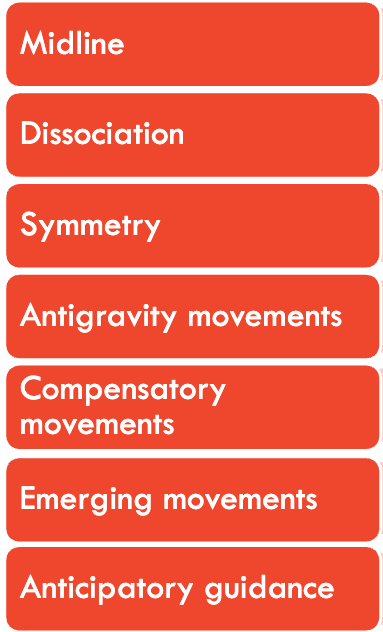1. Motor Development
1/21
Earn XP
Description and Tags
Flashcards covering typical motor development, motor control and learning, motor development theories, and clinical application in paediatric physiotherapy.
Name | Mastery | Learn | Test | Matching | Spaced |
|---|
No study sessions yet.
22 Terms
What is the focus of paediatric physiotherapy regarding motor development?
Understanding the emergence and maturation of motor skills in relation to multifactorial variables, not just the timing of milestones.
Name three categories of factors influencing motor development.
individual factors
environmental factors
exosystem environments
macrosystem environments
What are the common terminologies of an individual between 0-4 weeks, 4 weeks-1 year, 1-2 years, 3-5 years, 6-12 years, 13-18 years?
newborn/neonate
infant/baby
toddler
preschooler
school aged child
adolescent
Define 'Midline' in developmental paediatrics.
Orientating body segments and limbs to the center of the body.
What is the age in which a new admission to a children’s hospital typically stops?
16 years


orientate body segments and limbs to centre of body
able to move body segemnets and joints independely form one another
simlar or equal movement presentaton on either side
able to voluntarily lift bofy segment/limb against gravity
adopting a non-efficient movement pattern that may impari on future motor skills
movement patterns that can be seen to be developing
can be described as a proactive form of parental/caregiver education to promote optimal developmental outcomes for the infant/child
Define 'Astasia'.
Inability to stand upright unassisted
Define 'Abasia'.
Lack of motor coordination in walking
What does motor control refer to?
The way that the body and its nervous system work together to produce purposeful movement that is coordinated over a variety of environments.
What does motor learning focus on?
Understanding the acquisition and/or modification of movement, involving practice and exercise.
Name three theories of motor development.
Neural-maturational theories, Motor Programming theory, Cognitive theories, Dynamic Systems Theory.
What is the main force driving development according to the Neuro-maturational theory?
Maturation
What is a key concept in the Motor Programming Theory?
Central motor pattern.
What is the Behavioural theory of motor development?
Development occurs through interaction of the individual with the environment.
What is the Dynamic Systems Theory?
Emphasizes the process, not the product, and considers development not linear, influenced by many interacting internal and external factors.
Give an example of a negative external environmental influence on motor development
An impoverished environment, lack of parental education, poor nutrition, social isolation, poor living conditions, or inappropriate play areas.
List three components to consider within Dynamic Systems Approach.
Individual (Child), Task, Environment.
When designing paediatric treatment programs when treating children?
Design intervention strategies within the everyday context. PLAY!!!
What is often termed as Play-Directed Therapy?
Learning to move moving to learn
What should you incorporate when assessing and treating children?
Incorporate a Family-Centred Care approach
What is Early Intervention?
A systematic and planned effort to promote development through creating an appropriate environment and the opportunity for beneficial experiences, typically in the first 5-6 years of life.
What does Early Intervention consist of?
Multidisciplinary services aimed to promote child health and well-being, enhance competencies, minimize delays, remediate disabilities, prevent deterioration, and promote adaptive parenting.